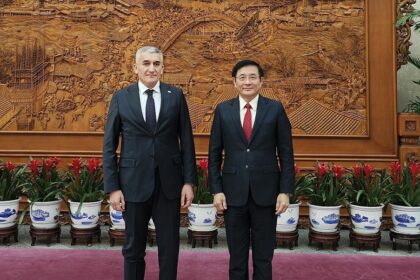RASC News Agency: As reports surface of behind-the-scenes consultations between the United Nations Assistance Mission in Afghanistan (UNAMA) and the Taliban concerning Afghanistan’s political future and its potential representation at the United Nations, a growing wave of criticism is emerging over the opaque and exclusionary nature of these dealings. Fawzia Koofi, a former member of the Afghanistani Parliament and a globally recognized advocate for women’s rights, strongly condemned the secretive dialogues. In a statement published on the social media platform X, Koofi warned that the Afghanistani people will no longer tolerate unilateral, backroom decision-making that excludes their voices. “No proposal concerning Afghanistan can succeed without the genuine participation of its people,” she wrote. “Such a process must be inclusive, transparent, and grounded in the real needs and will of the nation.”
Koofi emphasized that UNAMA must remain accountable to the people it purports to serve, and to the international taxpayers funding its operations. “The mission in Kabul exists to uphold the principles of the United Nations Charter especially the defense of human dignity, democratic values, and human rights. Any deviation from this mandate is both unacceptable and dangerous.” Her remarks came in response to reports that UN officials have been engaged in discussions about a political framework for Afghanistan’s future, including a possible move to assign the country’s UN seat to Suhail Shaheen, the Taliban’s nominated envoy. While these negotiations have not been officially confirmed, sources suggest the talks involve conditions such as the establishment of an inclusive government, the elimination of terrorist groups, and the removal of bans on women’s education and employment. In exchange, the Taliban reportedly seek formal international recognition, the lifting of sanctions, and the unfreezing of Afghanistan’s financial reserves.
However, Naseer Ahmad Faiq, the acting head of Afghanistan’s permanent mission to the United Nations, categorically denied any agreement regarding the UN seat. “There is no deal or arrangement involving the transfer of Afghanistan’s representation to the Taliban,” Faiq stated. He described the rumors as “irresponsible” and warned: “Any proposal that lacks transparency, democratic legitimacy, and meaningful participation of Afghanistani women and civil society is not only illegitimate it is fundamentally unacceptable.” In parallel, Qatar’s Ministry of Foreign Affairs announced that officials are currently coordinating with the United Nations to organize the fourth Doha meeting on Afghanistan. While the meeting is expected to address key political and humanitarian concerns, no official information has yet been released regarding the date, participant list, or agenda.
These developments come at a time when the future of Afghanistan remains perilously uncertain. The international community continues to grapple with whether and how to engage the Taliban, whose governance has been marked by repression, systemic gender apartheid, and exclusion of ethnic minorities. The legitimacy of any political solution crafted behind closed doors, without the inclusion of democratic voices and Afghanistani civil society, remains deeply in question.






